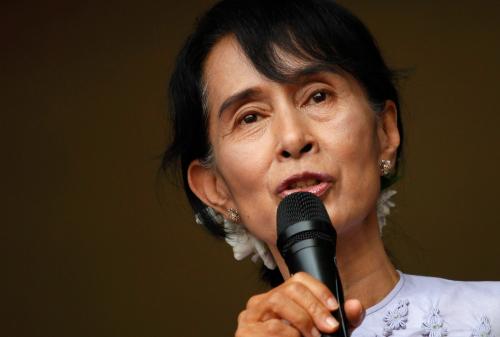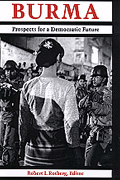Be thankful that the Washington Post does not make foreign policy decisions for the United States. A case in point is our relations with Myanmar, formerly known as Burma.
In its May 22 editorial (“Burma’s Path: U.S. Optimism May be Outrunning Reality”), the Post highlights the position of Representative Joseph Crowley (D-N.Y.), who claims “The big risk is that we’re going to lose leverage in terms of reform.” With the belief that sanctions can leverage reforms, Representative Crowley and others initiated legislative action last week to extend some of the U.S. sanctions against Burma for another year.
However, there was no mention in the editorial of a statement made by Senator Mitch McConnell on the floor of the Senate the day before: “I do not believe that Congress should reauthorize the . . . import sanctions [in the Burmese Freedom and Democracy Act].” From where I sit – in the center of U.S. political opinion and as an analyst of Myanmar’s economic and political development over the past five decades – Senator McConnell’s statement has much more significance for readers than Rep. Crowley’s remarks.
What’s going on here? How can one of our country’s most thoughtful newspapers do such a disservice to its readers?
The simplest explanation seems to be inertia. Since the 1990 elections in Myanmar, when Aung San Suu Kyi was blocked by a military junta from playing a leading role in the country’s governance following her party’s landslide victory, the Post has been one of the loudest and clearest voices in calling attention to the human rights abuses of Myanmar’s military rulers. These abuses were terrible, including the suppression of the monk-led Saffron Revolt in 2007, and the Post served its readers well by featuring them.
The rapid and unexpected progress Myanmar has made in the past two years toward democratic rule and economic prosperity has been encouraged by the engagement policy adopted in the first year of Barack Obama’s administration and has been rewarded by the progressive relaxation of a bewildering array of sanctions imposed over the past 20 years.
However, a civilian (but military dominated) government replaced the junta in 2011, and new President Thein Sein has since forged a remarkable partnership with Aung San Suu Kyi to lift the country out of the poverty and the conflicts of the past. She is now a member of the legislature, arguably the most prominent, and it is conceivable that she will emerge from the 2015 national elections as the country’s president. The rapid and unexpected progress Myanmar has made in the past two years toward democratic rule and economic prosperity has been encouraged by the engagement policy adopted in the first year of Barack Obama’s administration and has been rewarded by the progressive relaxation of a bewildering array of sanctions imposed over the past 20 years.
Violation of human rights is still a terrible fact of life in Myanmar today, especially in the army’s campaign against the Kachin ethnic minority and other minorities, and in the treatment of a Muslim group known as Rohingya. U.S. policy begins with efforts to reduce the human rights problems in Myanmar, but it doesn’t end there. In particular, it does not assume that U.S. sanctions can leverage reforms in Myanmar, as suggested by Representative Crowley, nor is it premised on the belief, implicit in Senator McConnell’s statement, that the historic transition underway in Myanmar today was prompted by the sanctions imposed by the United States and other countries.
Instead, U.S. policy gives credit for the astonishing turnaround in Myanmar’s governance to President Thein Sein and the other military and civilian leaders who saw that a course change was required to become a respected nation and who then had the courage to make it happen.
The last words come from Senator McConnell’s exceptional statement on the floor of the Senate, words that give the Post’s readers a better sense of our smart U.S. policy toward Burma/Myanmar than what they received in the May 22 editorial: “Many of us who have followed Burma for years never thought reform would come to this troubled country. This is an important moment and I believe it is time for Congress to take responsible action to continue to promote progress by encouraging those who are risking much within Burma . . .”









Commentary
Op-edThe Way Forward with Myanmar/Burma
May 24, 2013